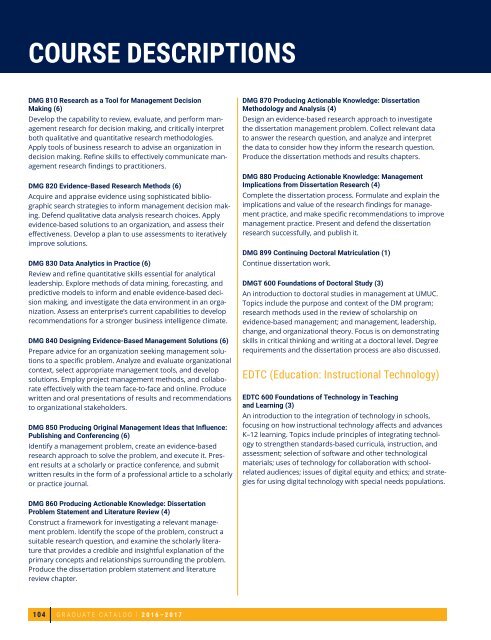2016–2017 2016–2017
2016-2017-graduate-catalog
2016-2017-graduate-catalog
You also want an ePaper? Increase the reach of your titles
YUMPU automatically turns print PDFs into web optimized ePapers that Google loves.
COURSE DESCRIPTIONS<br />
DMG 810 Research as a Tool for Management Decision<br />
Making (6)<br />
Develop the capability to review, evaluate, and perform management<br />
research for decision making, and critically interpret<br />
both qualitative and quantitative research methodologies.<br />
Apply tools of business research to advise an organization in<br />
decision making. Refine skills to effectively communicate management<br />
research findings to practitioners.<br />
DMG 820 Evidence-Based Research Methods (6)<br />
Acquire and appraise evidence using sophisticated bibliographic<br />
search strategies to inform management decision making.<br />
Defend qualitative data analysis research choices. Apply<br />
evidence-based solutions to an organization, and assess their<br />
effectiveness. Develop a plan to use assessments to iteratively<br />
improve solutions.<br />
DMG 830 Data Analytics in Practice (6)<br />
Review and refine quantitative skills essential for analytical<br />
leadership. Explore methods of data mining, forecasting, and<br />
predictive models to inform and enable evidence-based decision<br />
making, and investigate the data environment in an organization.<br />
Assess an enterprise’s current capabilities to develop<br />
recommendations for a stronger business intelligence climate.<br />
DMG 840 Designing Evidence-Based Management Solutions (6)<br />
Prepare advice for an organization seeking management solutions<br />
to a specific problem. Analyze and evaluate organizational<br />
context, select appropriate management tools, and develop<br />
solutions. Employ project management methods, and collaborate<br />
effectively with the team face-to-face and online. Produce<br />
written and oral presentations of results and recommendations<br />
to organizational stakeholders.<br />
DMG 850 Producing Original Management Ideas that Influence:<br />
Publishing and Conferencing (6)<br />
Identify a management problem, create an evidence-based<br />
research approach to solve the problem, and execute it. Present<br />
results at a scholarly or practice conference, and submit<br />
written results in the form of a professional article to a scholarly<br />
or practice journal.<br />
DMG 870 Producing Actionable Knowledge: Dissertation<br />
Methodology and Analysis (4)<br />
Design an evidence-based research approach to investigate<br />
the dissertation management problem. Collect relevant data<br />
to answer the research question, and analyze and interpret<br />
the data to consider how they inform the research question.<br />
Produce the dissertation methods and results chapters.<br />
DMG 880 Producing Actionable Knowledge: Management<br />
Implications from Dissertation Research (4)<br />
Complete the dissertation process. Formulate and explain the<br />
implications and value of the research findings for management<br />
practice, and make specific recommendations to improve<br />
management practice. Present and defend the dissertation<br />
research successfully, and publish it.<br />
DMG 899 Continuing Doctoral Matriculation (1)<br />
Continue dissertation work.<br />
DMGT 600 Foundations of Doctoral Study (3)<br />
An introduction to doctoral studies in management at UMUC.<br />
Topics include the purpose and context of the DM program;<br />
research methods used in the review of scholarship on<br />
evidence-based management; and management, leadership,<br />
change, and organizational theory. Focus is on demonstrating<br />
skills in critical thinking and writing at a doctoral level. Degree<br />
requirements and the dissertation process are also discussed.<br />
EDTC (Education: Instructional Technology)<br />
EDTC 600 Foundations of Technology in Teaching<br />
and Learning (3)<br />
An introduction to the integration of technology in schools,<br />
focusing on how instructional technology affects and advances<br />
K–12 learning. Topics include principles of integrating technology<br />
to strengthen standards-based curricula, instruction, and<br />
assessment; selection of software and other technological<br />
materials; uses of technology for collaboration with schoolrelated<br />
audiences; issues of digital equity and ethics; and strategies<br />
for using digital technology with special needs populations.<br />
DMG 860 Producing Actionable Knowledge: Dissertation<br />
Problem Statement and Literature Review (4)<br />
Construct a framework for investigating a relevant management<br />
problem. Identify the scope of the problem, construct a<br />
suitable research question, and examine the scholarly literature<br />
that provides a credible and insightful explanation of the<br />
primary concepts and relationships surrounding the problem.<br />
Produce the dissertation problem statement and literature<br />
review chapter.<br />
104<br />
GRADUATE CATALOG | <strong>2016–2017</strong>


